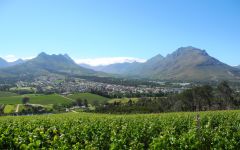Glenelly Estate Reserve Red 2014
-
Robert
Parker



Product Details
Your Rating
Somm Note
Winemaker Notes
Elegant bouquet of cassis, spicy plums and notes of toast in the background. Great intensity with fantastic freshness and fine elegant tannins.
Professional Ratings
-
Robert Parker's Wine Advocate
Made from a blend of 40% Cabernet Sauvignon, 19% Syrah, 18% Cabernet Franc, 18% Merlot and 5% Petit Verdot, the 2014 Estate Reserve Red starts with a dark ruby core that's almost opaque at the center. Aromas of dusty black cherry, sage, thyme with blackberry reduction and dusty red flowers sway out of the glass. Medium to full-bodied, the palate is dusty with ripe fruit flavors that continue to be marked with a green herbaceous note before lifting tannins elevate the expression across the mid-palate. The wine concludes with a juicy and soft herbaceous edge, showing elevated alcohol expressions on the aftertaste.
Other Vintages
2017-
Robert
Parker -
James
Suckling
-
Robert
Parker -
Wine
Enthusiast -
James
Suckling
-
Robert
Parker -
Wine
Enthusiast
-
James
Suckling -
Robert
Parker -
Wine
Spectator
-
Wine
Spectator









Located on the southern slopes of the Simonsberg, Glenelly is owned by May-Eliane de Lencquesaing, Bordeaux doyenne and former owner of Chateau Pichon Longueville Comtesse de Lalande. Struck by the tremendous potential of South Africa's terroir and the beauty of the country, Mme de Lencquesaing decided to embark on a French adventure on African soil. She purchased Glenelly in 2003, and subsequently planted 66 of the property's 128 hectares to vineyards. The first estate-grown fruit came on line in 2007, and Glenelly's state-of-the-art winery building was completed in 2009. The wines are fermented naturally and made with as little intervention as possible, seeking to achieve the perfect balance of French style and South African terroir.

With hundreds of red grape varieties to choose from, winemakers have the freedom to create a virtually endless assortment of blended red wines. In many European regions, strict laws are in place determining the set of varieties that may be used, but in the New World, experimentation is permitted and encouraged resulting in a wide variety of red wine styles. Blending can be utilized to enhance balance or create complexity, lending different layers of flavors and aromas. For example, a red wine blend variety that creates a fruity and full-bodied wine would do well combined with one that is naturally high in acidity and tannins. Sometimes small amounts of a particular variety are added to boost color or aromatics. Blending can take place before or after fermentation, with the latter, more popular option giving more control to the winemaker over the final qualities of the wine.
How to Serve Red Wine
A common piece of advice is to serve red wine at “room temperature,” but this suggestion is imprecise. After all, room temperature in January is likely to be quite different than in August, even considering the possible effect of central heating and air conditioning systems. The proper temperature to aim for is 55° F to 60° F for lighter-bodied reds and 60° F to 65° F for fuller-bodied wines.
How Long Does Red Wine Last?
Once opened and re-corked, a bottle stored in a cool, dark environment (like your fridge) will stay fresh and nicely drinkable for a day or two. There are products available that can extend that period by a couple of days. As for unopened bottles, optimal storage means keeping them on their sides in a moderately humid environment at about 57° F. Red wines stored in this manner will stay good – and possibly improve – for anywhere from one year to multiple decades. Assessing how long to hold on to a bottle is a complicated science. If you are planning long-term storage of your reds, seek the advice of a wine professional.

South Africa’s most famous wine-producing district, Stellenbosch, surrounds the historic town with the same name; fine winemaking here dates back to the late 1600s. Its valleys of granite, sandstone and alluvial loam soils between the towering blue-grey mountains of Stellenbosch, Simonsberg and Helderberg have the capacity to produce beautiful wines from many varieties. The climate is warm Mediterranean, tempered by the cool Atlantic air of nearby False Bay.
Perhaps most well-known for its Pinotage and Bordeaux blends, Stellenbosch also produces noteworthy wines from Syrah, Chenin blanc, Chardonnay and Sauvignon blanc. The district’s wards—Banghoek, Bottelary, Devon Valley, Jonkershoek Valley, Papegaaiberg, Polkadraai Hills and Simonsberg-Stellenbosch—all produce distinctive wines from vines with relatively low yields.
